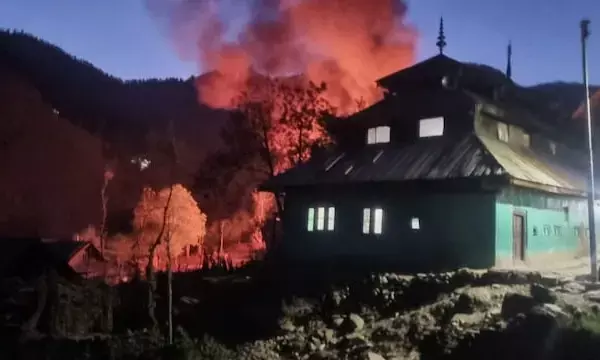War Clouds Recede
Back to the basics

The Americans appear to have stepped in, and the war clouds gathering over India and Pakistan are fast receding. As expected. Somehow the India-Pakistan trajectory following a terror attack — and there have been innumerable as we all know over the decades— is predictable. India hails fury as emotions within the country peak; Pakistan gets into a defensive- aggressive posture ‘we did not do it’ with a ‘we will hit you equally hard’; both wait for the other to take a step; Air Force jets often run sorties; diplomats of course are expelled at the onset from each others country and treaties or agreements abandoned; and then the United State moves in (regardless of which President is in the White House0 and the two back off.
One wonders why the two countries, or at least one, does not make a realistic assessment of the situation and realise that the solution lies in peace and not war. Mainly because the world is not interested in continuing this conflict beyond a point, and as the Americans must have communicated to both “we have too much going on and do not want another war”. At least not yet. And why do they both lack the understanding that independence in this small global world for them at least — for a variety of reasons—is compromised, and they cannot proceed with an attack or escalation of the conflict without US clearance.
It was clear to close observers of not just the aftermath of the Pahalgam terror attack but of the past decades, that the war language was subsiding very fast. The loud rhetoric on the Indus Water Treaty and the Simla Agreement was not really substantive, and after a few days both took steps that made it clear that some talks were in the offing. Either directly or over the famous hotlines. One, the Armies used their DGMO (Directorate of Military Operations) hotlines to communicate with each other. Who called first is meaningless in such a situation.
Two, both reshuffled their security apparatus significantly. Pakistan appointed its spy chief Director General of the Inter-Services Intelligence General Muhammad Asmi Mali as the new National Security Advisor. He will continue to hold both posts.And India brought in its former RAW chief Alok Joshi as the new chairperson of the National Security Advisory Board. This, as former bureaucrats aware of the bilateral processes between the two countries, was effectively setting the hierarchy within for consultations with each other.
US President Donald Trump’s condemnation of the terror attack was overread and misinterpreted by the crowing Indian media that seemed determined to push both India and Pakistan to war. His immediate clarification, both verbally and through a tweet, should have queered the war pitch but was largely ignored by the rabid anchors. But was taken note of and understood by the security and foreign policy establishment. Trump said very categorically that there were some tensions between India and Pakistan over Kashmir; that Kashmir was a longstanding “1000” and as he went on to say in the same breath “1500” years problem; and most significantly that both India and Pakistan were his friends. This was clearly an admission that there was no change in American policy and it continued to equate between the two. This alone gave the lie to the television anchor's insistence that Trump was with India, and had no time for Pakistan! Unfortunately, geo-politics does not work in this simplistic and foolhardy manner.
In the midst of the din not much has been heard by way of investigation of the terror attack. The attackers appeared suddenly, and after killing the innocent tourists, disappeared as easily. There has been no progress in identifying and apprehending them, despite the strong security and intelligence presence in Kashmir and the descriptions given by the survivors. The government has admitted to lapses but it would have been reassuring for the worried masses to get some idea of how the security loopholes here are being plugged. More so, as the question which even the tourist survivors and others at the spot have been repeatedly asking is, “why was there no security, how could this even happen, how could they get away?”
Perhaps time will answer some of these questions. And also give some inkling of what the government in its wisdom sees as the way forward. Clearly the status quo,of this sort of ‘hands off ‘ policy, is not working. Uneasy calm without dialogue does not work, as it also puts the shutters down on important avenues of overt and covert communication. When the chatter stops the intelligence machinery, as any part time sleuth will know, is debilitated. So will it be the status quo? War? well that the Americans have put out of the reckoning. So peace with dialogue? Sword fencing or real talk? Let's see what the morrow brings.
Cover Photograph: Suspects homes blown up in Jammu and Kashmir as government forces search for the terrorists involved in the Pahalgam massacre.


